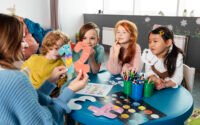Outdoor Classrooms & Nature-Based Learning in Pre and Primary
Today’s schools are changing, and nature-based learning and outdoor classes are becoming important parts of excellent early childhood education. Through real-life interactions with nature, these techniques stress experiential and all-around growth. More and more teachers are using nature-based activities in Pre Primary Teaching Courses to get kids interested in learning about the world around them and to make them more aware of their surroundings. This blog talks about nature-based learning, which is becoming more popular, and how it improves early childhood education.
Table of content
- What does Nature-Based Learning mean?
- Why are outdoor classrooms becoming more popular?
- Nature-Based Education in Early Years: Its Advantages
- How does learning outside help meet the goals of the curriculum?
- Nature-based experiences teach important skills.
- Is it possible to use technology in outdoor classrooms?
- What teachers need to do to help outdoors learning work
- How to Get Ready for This Method?
- Conclusion: The Future of Pre-Primary Education
- FAQ

What does Nature-Based Learning mean?
It is called nature-based learning, and it uses the natural world as an important part of teaching. The activities are meant to take place outside, in places like schoolyards, gardens, woods, parks, and more. Kids play freely, explore, and have lessons that are led by adults and focus on observing and interacting with the real world. It’s not just playing outside; it’s planned, organised, and developmental.
Why are outdoor classrooms becoming more popular?
The move towards outdoor classes is mostly because they are better for learning. Concerns about learning settings inside after the pandemic have also played a part. It’s becoming clear to both teachers and parents that kids need free time outside to grow emotionally, physically, and intellectually. As a result, schools are changing their offerings.

Nature-Based Education in Early Years: Its Advantages
There are many benefits to learning outside, especially when a child is still developing. It makes you more flexible, helps you focus, lowers your stress, and makes you think for yourself. Kids who spend a lot of time in nature tend to be more creative, have better social skills, and be able to control their emotions better than kids who go to regular schools.
How does learning outside help meet the goals of the curriculum?
Lessons that take place in nature can easily incorporate school goals from a regular lesson plan. Counting leaves is a way to teach maths, watching animals behave is a way to teach science, and telling stories outside helps kids learn language. Outdoor learning is now emphasised in many Pre Primary Teacher Training Course classes as a means of creatively achieving basic educational goals.

Nature-based experiences teach important skills.
From simple things like observing to big problems like fixing, learning outside helps kids develop important life skills. Children become stronger as they learn to make friends, work together in group tasks, and be responsible by taking care of animals and plants. These hands-on skills are important parts of a good Pre Primary Education Course.
Is it possible to use technology in outdoor classrooms?
Yes, hybrid methods are becoming more popular. People are using tablets and digital cameras to record what they find in nature, which helps them become better observers and reporters. Bringing technology outside helps kids learn how to use computers and stay connected to nature, which is something that is now emphasised in Online Pre Primary Teacher Training.

What teachers need to do to help outdoors learning work
In an outdoor learning place, teachers don’t run things; they help students learn. They need to be able to watch, change, and be well-prepared to help kids learn as they play and interact with their environment. A good Pre-Primary Teacher Diploma has modules on environmental education and hands-on learning that teach teachers how to successfully lead students in places with lots of nature.
How to Get Ready for This Method?
If teachers want to use nature-based learning, they should take a Pre Primary Teaching Course that covers nature-based teaching and planning activities to do outside. Future teachers will be able to make balanced and interesting learning environments for young children with the help of case studies, hands-on training, and time spent developing lessons outside.

Conclusion: The Future of Pre-Primary Education
As school systems change, nature-based learning and outdoor classes are becoming important parts of modern early education. Including nature in a Pre Primary Teaching Course fits with ideas that focus on the child and creates learners who are ready for the future and linked to their surroundings. This isn’t just a short-term experiment; it’s a shift towards teaching methods that are more responsive, inclusive, and developmental.
FAQ
1. What part does learning in nature play in pre-primary school?
Nature-based learning promotes development of the whole person by combining mental, social, and physical growth. It makes kids curious and lets them learn by doing in the real world, which is very important in the early years.
2. How can teachers in cities make outdoor learning a part of their lessons?
Teachers in cities can be creative with how they use parks, school yards, and rooftop plants. Even limited green spaces can be transformed into sensory-rich learning environments with proper planning and training.
3. Are there specific qualifications needed to conduct outdoor classes?
Yes, teachers should pursue an Online Pre Primary Teacher Training program that includes modules on outdoor education. This helps them structure nature-based activities aligned with curriculum goals.
4. Does outdoor learning replace traditional classroom education?
No, it complements it. Outdoor learning provides alternative methods to reinforce classroom lessons in an engaging way, enhancing retention and application of knowledge.
5. What are the key components of a good nature-based curriculum?
A balanced nature-based curriculum includes sensory activities, exploration tasks, observation logs, environmental storytelling, and child-led discovery projects—all aligned with early childhood learning outcomes.



